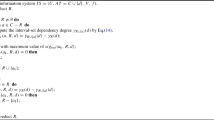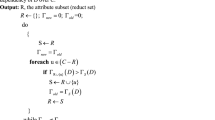Abstract
Categorical data is an important class of data in machine learning. Information system based on categorical data is called a categorical information system (CIS), a CIS with missing values is known as an incomplete categorical information system (ICIS) and an ICIS with decision attributes is said to be an incomplete categorical decision information system (ICDIS). Attribute selection is an important subject in rough set theory. This paper investigates attribute reduction in an ICDIS based on fuzzy rough sets. To depict the similarity for incomplete categorical data, fuzzy symmetry relations in an ICDIS are first introduced. Then, some attribute-evaluation functions, such fuzzy positive regions, dependency function and attribute importance functions are given. Next, the fuzzy-rough iterative computation model for an ICDIS is presented, and an attribute reduction algorithm in an ICDIS based on fuzzy rough sets is given. Finally, experiments are carried out as so to evaluate the performance of the proposed algorithm, and Friedman test and Bonferroni-Dunn test in statistics are conducted. The experimental results indicate that the proposed algorithm is more effective than some existing algorithms.


















Similar content being viewed by others
References
Cattaneo G, Chiaselotti G, Ciucci D, Gentile T (2016) On the connection of hypergraph theory with formal concept analysis and rough set theory. Inf Sci 330:342–357
Chen SL, Li JG, Wang XG (2005) Fuzzy sets theory and its application. Chinese Scientific Publishers, Beijing
Chen DG, Zhang L, Zhao SY, Hu QH, Zhu PF (2012) A novel algorithm for finding reducts with fuzzy rough sets. IEEE Trans Fuzzy Syst 20:385–389
Chen YM, Xue Y, Ma Y, Xu FF (2017) Measures of uncertainty for neighborhood rough sets. Knowl Based Syst 120:226–235
Chen LL, Chen DG, Wang H (2019) Fuzzy kernel alignment with application to attribute reduction of heterogeneous data. IEEE Trans Fuzzy Syst 27(7):1469–1478
Cornelis C, Jensen R, Martin GH, Slezak D (2010) Attribute selection with fuzzy decision reducts. Inf Sci 180:209–224
Dai JH, Wang WT, Tian HW, Liu L (2013) Attribute selection based on a new conditional entropy for incomplete decision systems. Knowl Based Syst 39:207–213
Dai JH, Hu H, Wu WZ, Qian YH, Huang DB (2018) Maximal-discernibility-pair-based approach to attribute reduction in fuzzy rough sets. IEEE Trans Fuzzy Syst 26(4):2175–2187
Dubois D, Prade H (1990) Rough fuzzy sets and fuzzy rough sets. Int J Gen Syst 17:191–208
Duntsch I, Gediga G (1998) Uncetainty measures of rough set prediction. Artif Intell 106:109–137
Frank A, Asuncion A (2010) UCI machine learning repository [Online]. http://archive.ics.uci.edu/ml
Giang NL, Son LH, Ngan TT, Tuan TM, Phuong HT, Abdel-Basset M, de Macêdo ARL, de Albuquerque VHC (2020) Novel incremental algorithms for attribute reduction from dynamic decision tables using hybrid filter-wrapper with fuzzy partition distance. IEEE Trans Fuzzy Syst 28(5):858–873
Hu Q, Yu D, Pedrycz W, Chen D (2011) Kernelized fuzzy rough sets and their applications. IEEE Trans Knowl Data Eng 23:1649–1667
Huang YY, Li TR, Luo C, Fujita H, Horng SJ (2017) Dynamic variable precision rough set approach for probabilistic set-valued information systems. Knowl Based Syst 122:131–147
Lang GM, Miao DQ, Cai MJ (2017) Three-way decision approaches to conflict analysis using decision-theoretic rough set theory. Inf Sci 406–407:185–207
Li H, Li DY, Zhai YH, Wang S, Zhang J (2016) A novel attribute reduction approach for multi-label data based on rough set theory. Inf Sci 367–368:827–847
Li ZW, Zhang PF, Ge X, Xie NX, Zhang GQ, Wen CF (2019) Uncertainty measurement for a fuzzy relation information system. IEEE Trans Fuzzy Syst 27(12):2338–2352
Li ZW, Huang D, Liu XF, Xie NX, Zhang GQ (2020) Information structures in a covering information system. Inf Sci 507:449–471
Li ZW, Liu XF, Dai JH, Chen JL, Fujita H (2020) Measures of uncertainty based on Gaussian kernel for a fully fuzzy information system. Knowl Based Syst 196:105791
Liang JY, Mi J, Wei W, Wang F (2013) An accelerator for attribute reduction based on perspective of objects and attributes. Knowl Based Syst 44:90–100
Liang JY, Wang F, Dang CY (2014) A group incremental approach to feature selection applying rough set technique. IEEE Trans Knowl Data Eng 26:294–304
Liu GL, Feng YB, Yang JT (2020) A common attribute reduction form for information systems. Knowl Based Syst 193:105466
Meng ZQ, Shi ZZ (2009) A fast approach to attribute reduction in incomplete decision systems with tolerance relation-based rough sets. Inf Sci 179:2774–2793
Moresi NN, Yankout MM (1998) Axiomatic for fuzzy rough sets. Fuzzy Sets Syst 100:327–342
Pankhuri J, Kumar TA, Tanmoy S (2020) A fitting model based intuitionistic fuzzy rough feature selection. Eng Appl Artif Intell 89:103421
Pawlak Z (1982) Rough sets. Int J Comput Inf Sci 11:341–356
Pawlak Z (1991) Rough sets: theoretical aspects of reasoning about data. Kluwer Academic Publishers, Dordrecht
Radzikowska AM, Kerre EE (2002) A comparative study of fuzzy rough sets. Fuzzy Sets Syst 126:137–155
Singh S, Shreevastava S, Som T, Somani G (2020) A fuzzy similarity-based rough set approach for attribute selection in set-valued information systems. Soft Comput 24(6):4675–4691
Slezak D (2002) Approximate entropy reducts. Fundam Inf 53:365–390
Tan AH, Wu WZ, Tao YZ (2018) A unified framework for characterizing rough sets with evidence theory in various approximation spaces. Inf Sci 454–455:144–160
Teng SH, Zhou SL, Sun JX, Li ZY (2010) Attribute reduction algorithm based on conditional entropy under incomplete information system. J Natl Univ Def Technol 32(1):90–94
Tran AD, Arch-int S, Arch-int N (2018) A rough set approach for approximating differential dependencies. Expert Syst Appl 114:488–502
Wang CZ, Qi Y, Shao MW, Hu QH, Chen DG, Qian YH, Lin YJ (2016) A fitting model for feature selection with fuzzy rough sets. IEEE Trans Fuzzy Syst 25:741–753
Wang CZ, Huang Y, Shao MW, Fan XD (2019) Fuzzy rough set-based attribute reduction using distance measures. Knowl Based Syst 164:205–212
Wang CZ, Wang Y, Shao MW, Qian YH, Chen DG (2020) Fuzzy rough attribute reduction for categorical data. IEEE Trans Fuzzy Syst 28(5):818–830
Xie NX, Liu M, Li ZW, Zhang GQ (2019) New measures of uncertainty for an interval-valued information system. Inf Sci 470:156–174
Yao YY (2008) Probabilistic rough set approximations. Int J Approx Reason 49:255–271
Yao YY, Zhang XY (2017) Class-specific attribute reducts in rough set theory. Inf Sci 418–419:601–618
Yu B, Guo LK, Li QG (2019) A characterization of novel rough fuzzy sets of information systems and their application in decision making. Expert Syst Appl 122:253–261
Zadeh LA (1965) Fuzzy sets. Inf Control 8(3):338–353
Zhang XX, Chen DG, Tsang EC (2017) Generalized dominance rough set models for the dominance intuitionistic fuzzy information systems. Inf Sci 378:1–25
Zhang GQ, Li ZW, Wu WZ, Liu XF, Xie NX (2018) Information structures and uncertainty measures in a fully fuzzy information system. Int J Approx Reason 101:119–149
Zhao H, Qin KY (2014) Mixed feature selection in incomplete decision table. Knowl Based Syst 57:181–190
Ziarko W (1993) Variable precision rough set model. J Comput Syst Sci 46:39–59
Acknowledgements
The authors would like to thank the editors and the anonymous reviewers for their valuable comments and suggestions, which have helped immensely in improving the quality of the paper. This work is supported by National Natural Science Foundation of China (11971420), Natural Science Foundation of Guangxi (AD19245102, 2020GXNSFAA159155, 2018GXNSFDA294003), Key Laborabory of Software Engineering in Guangxi University for Nationalities (2021-18XJSY-03) and Special Scientific Research Project of Young Innovative Talents in Guangxi (2019AC20052).
Author information
Authors and Affiliations
Corresponding authors
Additional information
Publisher's Note
Springer Nature remains neutral with regard to jurisdictional claims in published maps and institutional affiliations.
Rights and permissions
About this article
Cite this article
He, J., Qu, L., Wang, Z. et al. Attribute reduction in an incomplete categorical decision information system based on fuzzy rough sets. Artif Intell Rev 55, 5313–5348 (2022). https://doi.org/10.1007/s10462-021-10117-w
Published:
Issue Date:
DOI: https://doi.org/10.1007/s10462-021-10117-w




